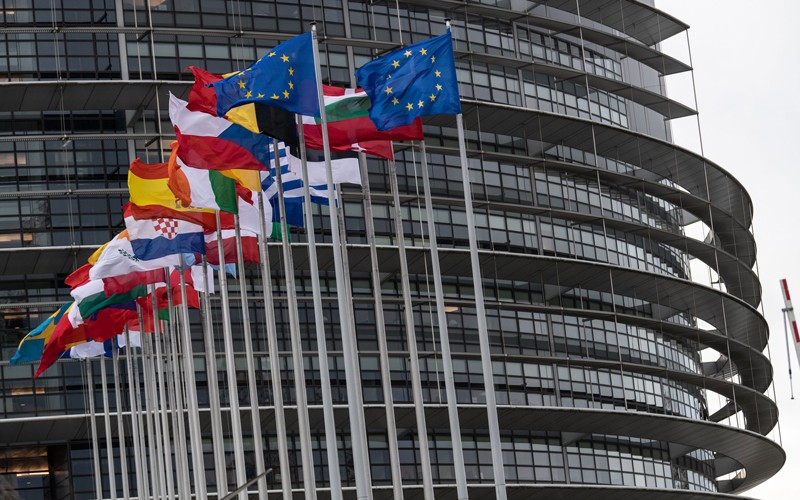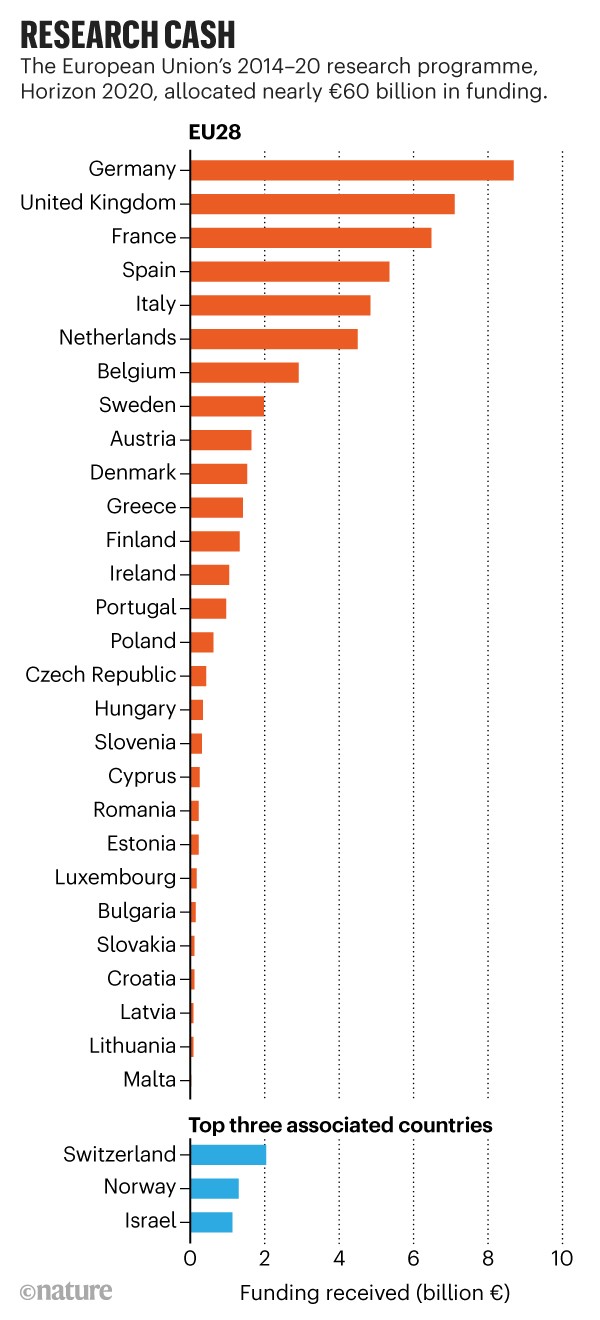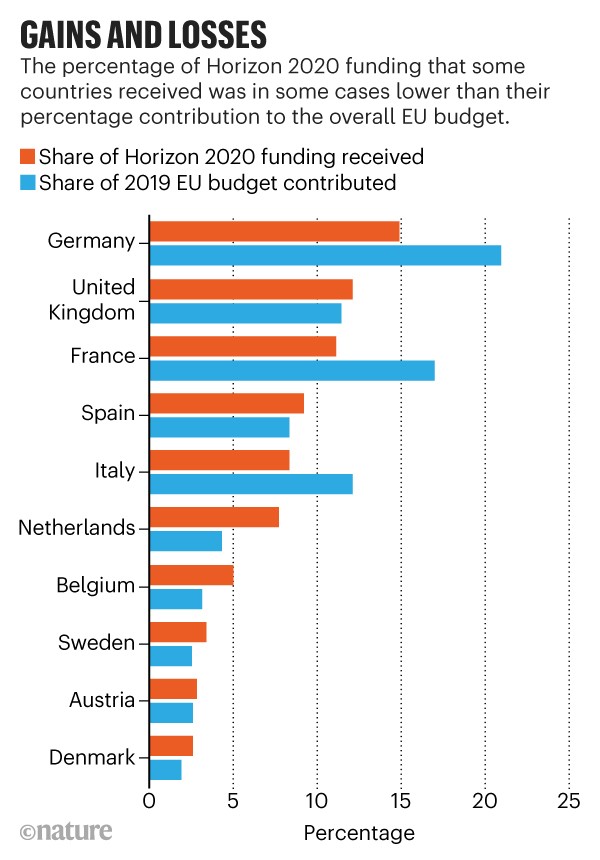The end of this year marks the close of the European Union’s massive 2014–20 research programme, Horizon 2020.
Over the past 6 years, more than 150,000 participants — including research institutes, companies and individual scientists — have collectively received almost €60 billion (US$73.5 billion) in research funding. Projects completed by December 2020 produced almost 100,000 peer-reviewed publications and around 2,500 patent applications and trademarks.
There were striking regional differences in the distribution of research money. Between them, the EU’s three biggest economies got almost 40% of the funds: researchers in Germany, France and the United Kingdom received a combined total of more than €22 billion (see ‘Research cash’). Some relatively small countries also benefited. Sweden, Denmark and Finland — which together account for just over 4% of the EU’s total population — collectively secured more than €4.8 billion in funding, around 8% of the total.
Despite efforts to strengthen research in formerly communist eastern Europe, there persists a distinct east–west divide in the European research landscape. Scientists and research institutions in Poland, Slovakia, Bulgaria and Romania were among the least successful participants in Horizon 2020, securing a combined total of just over €1 billion.
“The main reason is that the level of national research funding in eastern European countries is relatively low,” says Janusz Bujnicki, a bioinformatician at the International Institute of Molecular and Cell Biology in Warsaw and former member of a high-level group of scientific advisers to the European Commission. Researchers in the region are also less well integrated into informal networks of research consortia that compete successfully for EU grants, he says.
Leading nations
The United Kingdom received 12.1% (more than €7 billion) of the Horizon 2020 funding; by comparison, the country’s average contribution to the overall EU budget is around 11.4% of the total.
Germany took home the biggest percentage of Horizon 2020 funding (14.9%), but it contributes a higher percentage to the overall EU budget (20%). Likewise, France’s funding share (11.1%) was lower than its average contribution percentage to the EU budget (17%; see ‘Gains and losses’).
The United Kingdom also received the highest number of grants from the European Research Council (ERC), the main science-funding body of Horizon 2020. Of the nearly 7,000 principal investigators from 33 countries who received a prestigious ERC grant, around one-fifth (1,283) were at a UK institution. Germany and France received 1,095 and 774 ERC grants, respectively.
The United Kingdom officially left the EU in January, but it will continue to participate in Horizon 2020 until all projects are completed. The country’s involvement in the next EU research programme, Horizon Europe — which is worth €85 billion and is due to start in January 2021 — has not been decided. UK and EU negotiators are still trying to agree a trade deal that will determine their future relationship by 31 December, when an 11-month ‘transition period’ expires.
UK politicians have repeatedly stated their intention to join Horizon Europe as an ‘associated country’, which would enable researchers based in the United Kingdom to participate in the same way as those in the EU. There are currently 16 non-EU associated countries, which pay a mandatory contribution to the bloc’s research programme in exchange for access to grants.
Some existing associated countries, such as Switzerland, Norway and Israel, were highly successful in Horizon 2020. In Switzerland, restrictions on immigration following a 2014 referendum temporarily excluded the country from competing for EU research money. But despite this, the country won a larger number of ERC grants (465) than some much larger EU countries, such as Italy (395) and Spain (431). Switzerland’s leading universities, the federal institutes of technology in Zurich and Lausanne, are among the most successful research organizations participating in Horizon 2020 (see ‘Top ten’).
Top ten: Horizon 2020’s ten10 most successful participating research units
|
Name |
Country |
Net Horizon 2020 funding received (million €) |
|---|---|---|
|
French National Centre for Scientific Research |
France |
1,023 |
|
French Alternative Energies and Atomic Energy Commission |
France |
637 |
|
Fraunhofer Society |
Germany |
595 |
|
Max Planck Society |
Germany |
590 |
|
University of Oxford |
UK |
460 |
|
University of Cambridge |
UK |
415 |
|
University College London |
UK |
372 |
|
Swiss Federal Institute of Technology Zurich |
Switzerland |
354 |
|
Swiss Federal Institute of Technology Lausanne |
Switzerland |
333 |
|
University of Copenhagen |
Denmark |
321 |
Without some form of UK association, “we will have thrown away the soft yet vital infrastructure for international collaboration that it will be slow, painful and expensive to rebuild”, says James Wilsdon, who studies research policy at the University of Sheffield, UK. “The loser will not be the UK, or the EU, but science.”
If UK researchers are unable to participate in EU programmes as they have before, it will be difficult to replace the ability to establish the kind of collaborative international networks that Horizon 2020 has offered, says Kieron Flanagan, a science-policy researcher at the University of Manchester, UK.
“If you pull away the support structures for collaborative research, it will have knock-on effects on the recruitment of international scientists, researchers and engineers to the UK,” he says.
"up" - Google News
December 22, 2020 at 07:19PM
https://ift.tt/3h6I5F6
Horizon 2020 by the numbers: how €60 billion was divided up among Europe's scientists - Nature.com
"up" - Google News
https://ift.tt/350tWlq
Bagikan Berita Ini




















0 Response to "Horizon 2020 by the numbers: how €60 billion was divided up among Europe's scientists - Nature.com"
Post a Comment